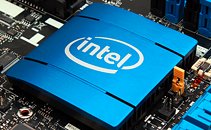A few weeks ago we talked about Intel problems in the production chain. The semiconductor giant was facing a shortage of 14 nm CPUs probably due to Intel allocating volumes from the same 14 nm++ node for its upcoming 9th Generation Core processors. That caused a clear rise in the prices of processors like the Core i7-8700K, which had a launch price of $359 and was hard to find for less than $400 a month ago. Prices have relaxed since then, but are still higher than their launch ones.
Intel's processor shortage could continue in the coming months, and in fact Jerry Shen, CEO of Asustek Computer, explained how the problem will continue until at least the second quarter of 2019. In his words, "the continued CPU supply crunch, escalating US-China trade disputes, and increasing competition in the notebook segment in Europe have pressed down Asustek's "operational visibility" for the fourth quarter of 2018 to the lowest level of 20% compared to an over 50% seen in previous years".


Intel has tried to solve the problem, but the priority in the production of the processors of the Xeon and Core families has made that CPUs for the entry-level have been especially affected by this shortage. Shen noted though that "with Intel maintaining its shipments of CPUs to the server and gaming PC sectors, Asustek's gaming PC business has seen little impact from the CPU shortfalls". Intel's reduced supply has been one of the reasons for the company's somewhat poor financial results, whose PC shipments will remain flat in the fourth quarter of 2018 compared to the previous quarter.
View at TechPowerUp Main Site
Intel's processor shortage could continue in the coming months, and in fact Jerry Shen, CEO of Asustek Computer, explained how the problem will continue until at least the second quarter of 2019. In his words, "the continued CPU supply crunch, escalating US-China trade disputes, and increasing competition in the notebook segment in Europe have pressed down Asustek's "operational visibility" for the fourth quarter of 2018 to the lowest level of 20% compared to an over 50% seen in previous years".


Intel has tried to solve the problem, but the priority in the production of the processors of the Xeon and Core families has made that CPUs for the entry-level have been especially affected by this shortage. Shen noted though that "with Intel maintaining its shipments of CPUs to the server and gaming PC sectors, Asustek's gaming PC business has seen little impact from the CPU shortfalls". Intel's reduced supply has been one of the reasons for the company's somewhat poor financial results, whose PC shipments will remain flat in the fourth quarter of 2018 compared to the previous quarter.
View at TechPowerUp Main Site





